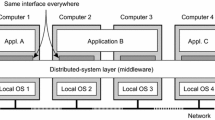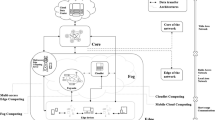Abstract
Resource overloading causes one of the main challenges in computing environments. In this case, a new resource should be discovered to transfer the extra load. However, this results in drastic performance degradation. Thus, it is of high importance to discover the appropriate resource at first. So far, several resource discovery mechanisms have been introduced to overcome this challenge, a majority of which neglect the fact that this important decision should be made in cooperation with other units existing in a computing environment. One of the units is load balancing. In this paper, we propose a model for communication between resource discovery and load balancing units in a computing environment. Based on the model, resource discovery and load balancing decisions are made cooperatively considering the behavior of running processes and resources capacities. These considerations make decisions more precise. In addition, the model presents the loosest type of coupling between resource discovery and load balancing units, i.e., message coupling. This feature provides a better scalability in size for the model. Comparative results show that the proposed model increases scalability in size by 7 to 15 %, cuts message transmission rate by 15 % and improves hit rate by 51 %.










Similar content being viewed by others
References
Meshkova E, Riihijärvi J, Petrova M, Mähönen P (2008) A Survey on resource discovery mechanisms, peer to peer and service discovery frameworks. J Comput Netw 24(6):2097–2128
Arab MN, Mirtaheri SL, Khaneghah EM, Sharifi M, Mohammadkhani M (2011) Improving learning-based request forwarding in resource discovery through load-awareness. In: International Conference on Data Management in Grid and P2P Systems, Toulouse, pp 73–82
Nitzberg B, Schopf JM, Jones JP (2004) PBS Pro: Grid computing and scheduling attributes. Kluwer Academic Publishers, Norwell
Moab Grid Suite (2012). [AAOnline]. http://www.adaptivecomputing.com/products/hpc-products/moab-hpc-basic-edition/. Accessed on Sep 2012
Milojicic DS (2002) Peer to Peer Computing. Technical Report HPL-2002-57. HP Laboratories, Palo Alto
Ghamri-Doudane S, Agoulmine N (2007) Enhanced DHT-based P2P architecture for effective resource discovery and management. Netw Syst Manag 19(3):335–354
Iamnitchi A, Foster I, Nurmi DC (2002) A Peer-to-Peer approach to resource discovery in grid environments. In: High performance distributed computing, Edinburgh, Scotland, pp 20–28
Tangpongprasit S, Katagiri T, Kise K, Honda H, Yuba T (June 2005) A time-to-live based reservation algorithm on fully decentralized resource discovery in grid computing. Parallel Comput 31(6):529–543
Schmidt C, Parashar M (2003) Flexible information discovery in decentralized distributed systems. In: 12th High Performance Distributed Computing, Seattle, pp 226–235
Hasanzadeh M, Meybodi MR (2013) Grid resource discovery based on distributed learning automata. Comput J. doi:10.1007/s00607-013-0337-x, published online
Deng Y, Wang F, Ciura A (2009) Ant colony optimization inspired resource discovery in P2P Grid systems. J Supercomput 49(1):4–21
Mirtaheri SL, et al (2011) RNS: remote node selection for HPC clusters. In: 17th Int’l Conference on Parallel and Distributed Processing Techniques and Applications, Las Vegas, pp 23–30
Khaneghah EM, Nezhad NO, Mirtaheri SL, Sharifi M, Shirpour A (2011) An efficient live process migration approach for high performance cluster computing systems. In: 1st International Conference on Innovative Computing Technology, Tehran, pp 49–55
Dodonov E, de Mello RF (2010) novel approach for distributed application scheduling based on prediction of communication events. Future Gener Comput Syst 26(5):740–775
Hennessy M, Merro M, Rathke J (2002) Towards a behavioural theory of access and mobility control in distributed systems. School of Cognitive and Computing Sciences, University of Sussex, pp 1350–3170
Author information
Authors and Affiliations
Corresponding author
Rights and permissions
About this article
Cite this article
Arab, M.N., Sharifi, M. A model for communication between resource discovery and load balancing units in computing environments. J Supercomput 68, 1538–1555 (2014). https://doi.org/10.1007/s11227-014-1124-y
Published:
Issue Date:
DOI: https://doi.org/10.1007/s11227-014-1124-y




